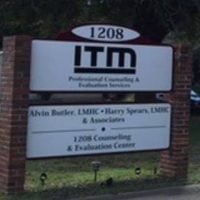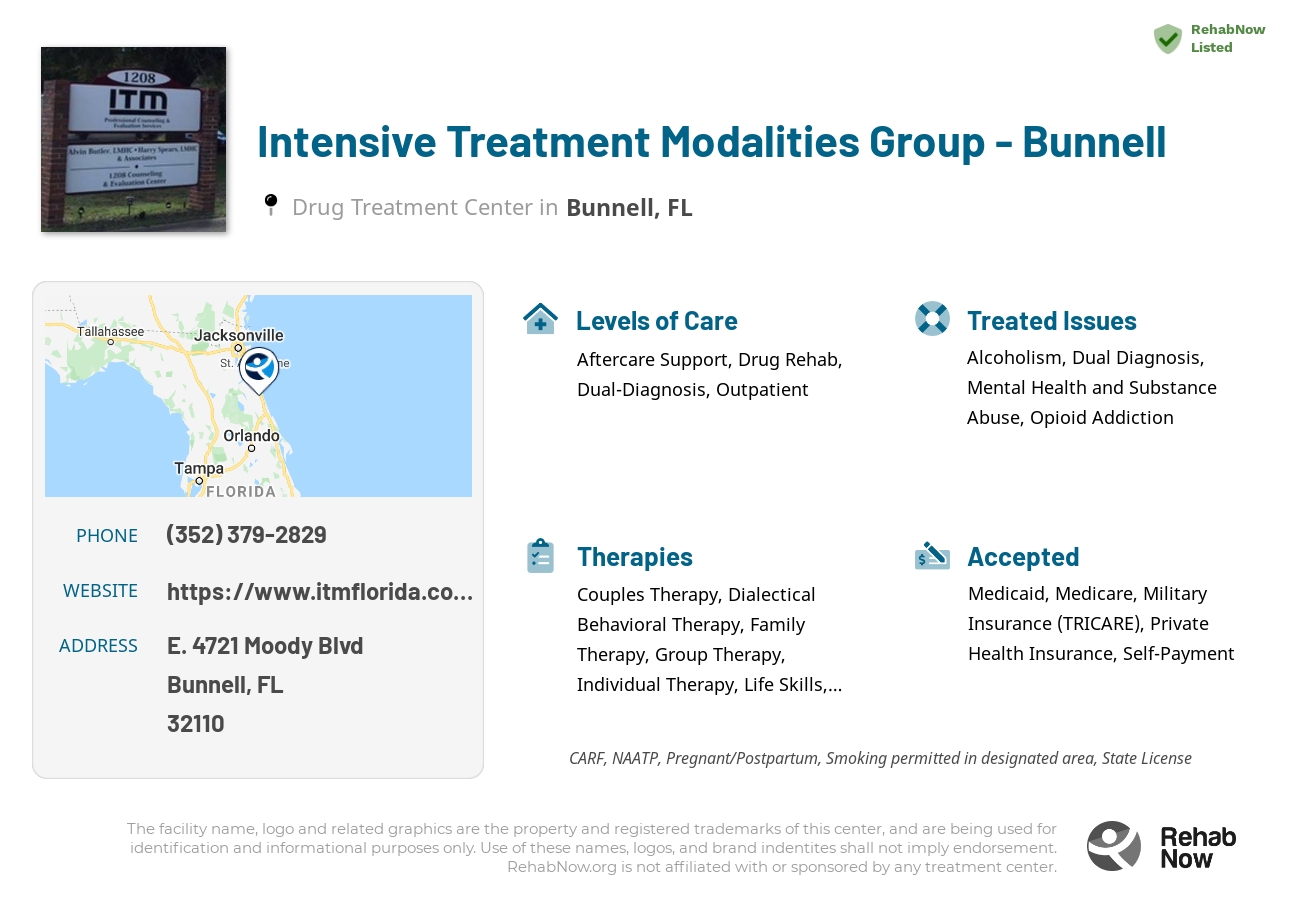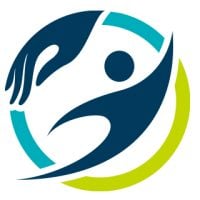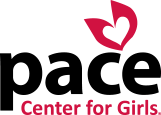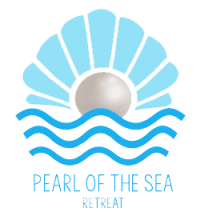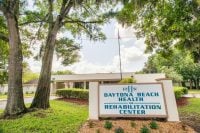Intensive Treatment Modalities Group - Bunnell
Drug Rehab Center in Bunnell, Florida
Bunnell's Intensive Treatment Modalities Group is a Florida-based clinic that offers personalized treatment plans for individuals seeking recovery from substance use disorders, with a wide range of services including therapy, life skills training, and aftercare support.
About This Florida Facility
Intensive Treatment Modalities Group - Bunnell is a clinic that offers treatment and support for individuals with substance use disorders. They provide compassionate care to those individuals seeking recovery from alcohol, opioid addiction, drug addiction, and dual diagnosis. Located in Bunnell, Florida, their treatment services are tailored to suit their clients’ needs for long-term sobriety.
Their array of treatment programs cover a variety of recovery needs and can be tailored to meet the needs of each patient. The care model provides a wide range of services designed to provide treatment in a safe and supportive environment. Treatment protocols can include individual and group therapy, couples therapy, dialectical behavior therapy, life skills and aftercare support. In addition to their personalized treatment plans, the clinic offers a safe, secure, and compassionate environment. They accept private health insurance, to help ensure their clients get the best care possible.
Genders
Ages
Modality
Additional
Conditions and Issues Treated
Opioid addiction treatment should be done in a medically supervised drug rehab. Opioid addiction treatment will include detoxification and drug rehab counseling to help both the user and their loved ones learn how to live a successful sober lifestyle. Methadone, buprenorphine, and naltrexone are three medications that can help treat opioid addiction. Individual drug rehab counseling sessions can be helpful to discuss any questions or concerns with the drug treatment program.
When addiction and psychiatric issues co-occur, the addict’s recovery is more successful when both conditions are treated. A dual diagnosis refers to a condition in which the patient is diagnosed with two health issues: addiction and bipolar disorder.
Usually, dual diagnosis sufferers are prescribed a combination of treatments for each condition. The most common therapies are psychotherapy, behavioral therapy, spiritual counseling, 12-step programs, and medication management.
Psychiatric conditions are an obstacle to recovery because they can create roadblocks to a healthy lifestyle. Drugs and alcohol may be used as a means of self-medication, which can have dangerous consequences. Over time, addicts build up a tolerance and suffer withdrawal symptoms when drug use is stopped.
With the proper treatment, dual diagnosis sufferers can overcome their conditions and achieve lasting sobriety.
Levels of Care Offered at Intensive Treatment Modalities Group - Bunnell
This center offers a variety of custom treatment tailored to individual recovery. Currently available are Aftercare Support, Drug Rehab, Dual-Diagnosis, Outpatient, with additional therapies available as listed below.
Individuals struggling with drug addictions can get help from several treatment options, including inpatient and outpatient programs. Outpatient drug treatment programs can also provide patients with different levels of care, usually depending on the patient’s degree of addiction.
At an outpatient program in Bunnell, a patient will attend a recovery program during the day and return home in the evening. Suppose a patient is struggling with drug addiction. In that case, an outpatient program can serve as an effective transition point during the recovery process.
Aftercare is a part of drug rehabilitation. It is also known as “post-treatment support.” Aftercare programs are available for addicts after they complete drug rehab. It is often the final step in the recovery process. The goal of aftercare is to ensure that addicts maintain their achievements in rehab and do not relapse. Professionals generally provide aftercare (including addiction therapists, physicians, social workers, psychologists) and involve individual and group therapy sessions.
Therapies & Programs
Individual therapy is a critical component of addiction recovery. It allows the patients to go deep into their core issues and discover how to handle those problems better. Therapy can be conducted in individual sessions as well as group settings. In individual therapy for addiction, the patient meets with their therapist one-on-one to focus on the underlying issues. This allows patients to open up and discuss personal topics they may not feel comfortable discussing in a group setting. This type of therapy can help develop solutions specific to each patient, which helps speed up the recovery process.
Couples therapy is beneficial for couples in which at least one partner has a substance use disorder. This type of therapy can help partners improve communication skills, which is an important factor in a healthy relationship. It can also help partners better understand one another so they have a greater understanding of how the other partner may be feeling.
Benefits of couples therapy include:
- Improvement in communication skills
- Increased understanding of the dynamics within a relationship
- Increased sense of support and trust in the relationship
- Better teamwork between partners/increased willingness to listen and work together
- Enhanced tolerance of each other’s shortcomings
- Improved ability to have open, honest communication with each other
Family therapy is a crucial part of drug treatment and getting sober. It is one of the most effective ways to help addicts stay on the path to long-term sobriety. When a drug addict decides that they want to try and get sober, it takes the support of every person they love to succeed. It can be incredibly difficult for loved ones to watch an addict go through the pain and suffering of withdrawal, but by being there with them and supporting them, they can help to make sure that the addiction never returns.
One of the most important parts of family therapy is the relapse prevention plan. During treatment, therapists and doctors will often sit down with the addict and their family to develop a plan in case the addict ever feels like they want to use again. This plan should involve steps the addict and family can take together to prevent them from relapsing in the future. An addict’s family can play a vital part in helping them to avoid relapse because they can spot the warning signs and help them get back on track before it becomes too much of a problem.
Group therapy helps prevent addicts from feeling isolated or unique in their situation by offering a sense of comfort and fellowship. It also creates a forum for addicts to build their support systems and learn from each other. The group therapy sessions at Intensive Treatment Modalities Group - Bunnell occur in a group setting rather than one-on-one to create a safer, controlled environment where addicts feel comfortable.
Dialectical Behavior Therapy was developed in the 1980s to treat chronically suicidal individuals. It is a cognitive-behavioral therapy that combines strategies derived from Zen Buddhism, such as mindfulness training. DBT has been adapted for use with other types of psychiatric problems, including substance abuse and personality disorders. DBT aims to help patients change their thinking and behavior, instead of relying on medication.
Cognitive Behavioral Therapy (CBT) is a common therapeutic approach to help drug addicts. It teaches addicts new ways of thinking and behaving so that they can avoid relapse. There are several forms of CBT used in drug rehabilitation centers.
Cognitive Restructuring helps addicts identify faulty, negative thinking so that they can work together with the therapist to find healthier ways of thinking, resulting in better decision-making.
Cognitive Behavioral Therapy for Addiction uses the principles of CBT to help treat addiction. It focuses on specific aspects of each person’s thinking, feeling, physiology, and behavior. It aims to identify specific problems in these areas and create a personalized treatment strategy.
The best drug treatment centers offer various services to help addicts learn how to live without drugs. Since addiction is a chronic physical and mental illness, addicts need to learn as many life skills as possible to help them stay clean and sober.
Many drug treatment centers like Intensive Treatment Modalities Group - Bunnell offer life skills activities as part of their addiction recovery programs. Examples include cooking classes, employment training, resume writing seminars, parenting classes, and computer training. When addicts have various life skills to lean on, they’re better equipped to put their addiction behind them for good.
The primary goal of life skills activities at drug treatment centers like Intensive Treatment Modalities Group - Bunnell is to help addicts recover from addiction and learn how to live a useful, productive life. Life skills activities help addicts find employment, take care of their families, and give back to the community. After learning about these various life skills, addicts are better prepared to return to society and lead happy healthy lives.
Payment Options Accepted
For specific insurance or payment methods please contact us.
Is your insurance accepted?
Ask an expert, call (888) 674-0062
Intensive Treatment Modalities Group Associated Centers
Discover treatment facilities under the same provider.
- Intensive Treatment Modalities Group - Pinellas Park in Pinellas Park, FL
- Intensive Treatment Modalities Group - Orlando in Orlando, FL
- Intensive Treatment Modalities Group - Palatka in Palatka, FL
- Intensive Treatment Modalities Group - Saint Augustine in Saint Augustine, FL
- Intensive Treatment Modalities Group - Starke in Starke, FL
Learn More About Intensive Treatment Modalities Group Centers
Additional Details
Specifics, location, and helpful extra information.
Bunnell, Florida 32110 Phone Number(352) 379-2829 Meta DetailsUpdated November 25, 2023
Staff Verified
Patient Reviews
There are no reviews yet. Be the first one to write one.
Bunnell, Florida Addiction Information
Florida is one of the nation's epicenters for substance abuse and drug-related overdoses. In 2014, around 410,000 Florida residents were addicted to drugs and alcohol. Over the last 10 years, 12% of all deaths in the state were attributed to substance abuse. Treatment admissions for alcohol reached 24,329 patients in 2016, and 2.5% of Florida high school students admitted to using crack cocaine.
The drug addiction problem in Bunnell, Florida, is quite bad. According to recent statistics, there are around 7,000 people who struggle with addiction in the city. Bunnell has a very high rate of drug-related deaths. There were 22 drug-related deaths in 2017 alone. The treatment process depends on the type of addiction. In general, most rehab centers will offer a variety of therapies and treatments to help you get sober.
Treatment in Nearby Cities
- Saint Cloud, FL (84.8 mi.)
- Perrine, FL (273.2 mi.)
- Madeira Beach, FL (150.2 mi.)
- Citra, FL (53.5 mi.)
- De Bary, FL (42.2 mi.)
Centers near Intensive Treatment Modalities Group - Bunnell
The facility name, logo and brand are the property and registered trademarks of Intensive Treatment Modalities Group - Bunnell, and are being used for identification and informational purposes only. Use of these names, logos and brands shall not imply endorsement. RehabNow.org is not affiliated with or sponsored by Intensive Treatment Modalities Group - Bunnell.
